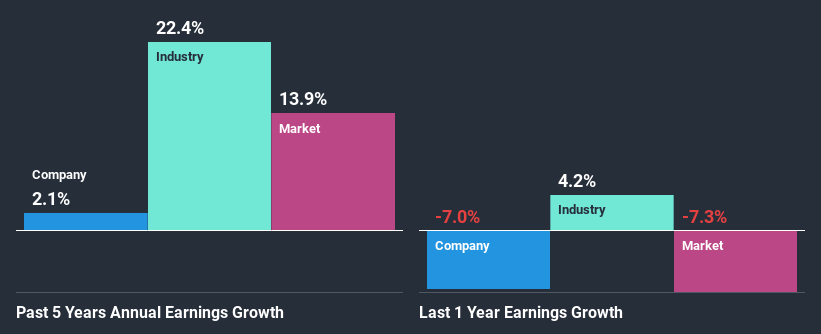- India
- /
- Trade Distributors
- /
- NSEI:VINYLINDIA
Has Vinyl Chemicals (India) Limited's (NSE:VINYLINDIA) Impressive Stock Performance Got Anything to Do With Its Fundamentals?

Vinyl Chemicals (India)'s (NSE:VINYLINDIA) stock is up by a considerable 29% over the past three months. As most would know, fundamentals are what usually guide market price movements over the long-term, so we decided to look at the company's key financial indicators today to determine if they have any role to play in the recent price movement. Specifically, we decided to study Vinyl Chemicals (India)'s ROE in this article.
Return on equity or ROE is an important factor to be considered by a shareholder because it tells them how effectively their capital is being reinvested. Put another way, it reveals the company's success at turning shareholder investments into profits.
Check out our latest analysis for Vinyl Chemicals (India)
How Is ROE Calculated?
The formula for ROE is:
Return on Equity = Net Profit (from continuing operations) ÷ Shareholders' Equity
So, based on the above formula, the ROE for Vinyl Chemicals (India) is:
13% = ₹79m ÷ ₹611m (Based on the trailing twelve months to June 2020).
The 'return' refers to a company's earnings over the last year. That means that for every ₹1 worth of shareholders' equity, the company generated ₹0.13 in profit.
Why Is ROE Important For Earnings Growth?
We have already established that ROE serves as an efficient profit-generating gauge for a company's future earnings. Based on how much of its profits the company chooses to reinvest or "retain", we are then able to evaluate a company's future ability to generate profits. Assuming all else is equal, companies that have both a higher return on equity and higher profit retention are usually the ones that have a higher growth rate when compared to companies that don't have the same features.
A Side By Side comparison of Vinyl Chemicals (India)'s Earnings Growth And 13% ROE
At first glance, Vinyl Chemicals (India)'s ROE doesn't look very promising. However, the fact that the company's ROE is higher than the average industry ROE of 5.2%, is definitely interesting. Yet, Vinyl Chemicals (India) has posted measly growth of 2.1% over the past five years. Bear in mind, the company does have a low ROE. It is just that the industry ROE is lower. Therefore, the low growth in earnings could also be the result of this.
As a next step, we compared Vinyl Chemicals (India)'s net income growth with the industry and were disappointed to see that the company's growth is lower than the industry average growth of 22% in the same period.

The basis for attaching value to a company is, to a great extent, tied to its earnings growth. The investor should try to establish if the expected growth or decline in earnings, whichever the case may be, is priced in. This then helps them determine if the stock is placed for a bright or bleak future. One good indicator of expected earnings growth is the P/E ratio which determines the price the market is willing to pay for a stock based on its earnings prospects. So, you may want to check if Vinyl Chemicals (India) is trading on a high P/E or a low P/E, relative to its industry.
Is Vinyl Chemicals (India) Making Efficient Use Of Its Profits?
While Vinyl Chemicals (India) has a decent three-year median payout ratio of 50% (or a retention ratio of 50%), it has seen very little growth in earnings. So there might be other factors at play here which could potentially be hampering growth. For example, the business has faced some headwinds.
In addition, Vinyl Chemicals (India) has been paying dividends over a period of at least ten years suggesting that keeping up dividend payments is way more important to the management even if it comes at the cost of business growth.
Summary
Overall, we feel that Vinyl Chemicals (India) certainly does have some positive factors to consider. However, while the company does have a decent ROE and a high profit retention, its earnings growth number is quite disappointing. This suggests that there might be some external threat to the business, that's hampering growth. While we won't completely dismiss the company, what we would do, is try to ascertain how risky the business is to make a more informed decision around the company. You can see the 2 risks we have identified for Vinyl Chemicals (India) by visiting our risks dashboard for free on our platform here.
If you’re looking to trade Vinyl Chemicals (India), open an account with the lowest-cost* platform trusted by professionals, Interactive Brokers. Their clients from over 200 countries and territories trade stocks, options, futures, forex, bonds and funds worldwide from a single integrated account. Promoted
New: Manage All Your Stock Portfolios in One Place
We've created the ultimate portfolio companion for stock investors, and it's free.
• Connect an unlimited number of Portfolios and see your total in one currency
• Be alerted to new Warning Signs or Risks via email or mobile
• Track the Fair Value of your stocks
This article by Simply Wall St is general in nature. It does not constitute a recommendation to buy or sell any stock, and does not take account of your objectives, or your financial situation. We aim to bring you long-term focused analysis driven by fundamental data. Note that our analysis may not factor in the latest price-sensitive company announcements or qualitative material. Simply Wall St has no position in any stocks mentioned.
*Interactive Brokers Rated Lowest Cost Broker by StockBrokers.com Annual Online Review 2020
Have feedback on this article? Concerned about the content? Get in touch with us directly. Alternatively, email editorial-team@simplywallst.com.
About NSEI:VINYLINDIA
Flawless balance sheet established dividend payer.
Similar Companies
Market Insights
Community Narratives




